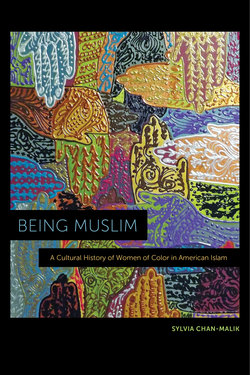Being Muslim

Реклама. ООО «ЛитРес», ИНН: 7719571260.
Оглавление
Sylvia Chan-Malik. Being Muslim
Отрывок из книги
BEING MUSLIM
A Cultural History of Women of Color in American Islam
.....
Yet despite these shifts, Elsayed is engaged in Muslim-ness as a state of insurgent being against hegemonic norms of race, gender, and religion in America. In 2015, Elsayed’s experience of being Muslim is forged vis-à-vis orientalist constructions of Islam as a signifier of foreignness and terrorism, as well as against ongoing logics of white and Christian supremacy that produce U.S. Muslims as lesser citizens. Like Sister Sonia Sanchez before her, Elsayed incorporates the charged political nature of Islam and being Muslim in the nation’s cultural imaginary into her processes of identity formation as a U.S. Muslim woman. Unlike being Muslim in Sanchez’s poem, however, Elsayed’s Muslim-ness in 2015 is not a pronouncement of political or spiritual empowerment, nor is it a means to reject the violence and dehumanization of racism; instead, it is a grappling with her existence as its constant projection. For Nourhan Elsayed, fifteen years after the start of the War on Terror, in the face of the demographic shifts within U.S. Muslim communities and in U.S.-Middle East relations, and following the horrific murder of three young U.S. Muslims in Chapel Hill, North Carolina, being Muslim is to feel profoundly unsafe because of one’s Muslim-ness while seeking solace or refuge in her Islamic beliefs and practices. Thus, whereas Sonia Sanchez and other Black women embraced Islam as space of safety and sanctuary from anti-Black racism and sexual violence, young women like Elsayed struggle with whether to even express their Muslim identity in public spaces for fear of recrimination while navigating how to practice Islam as a faith while confronting “Islam” as a racialized and pathologized trope of terror. Yet in both instances—whether in the embrace of “Islam” and Muslim womanhood as an ethos of Black liberation and protection, or in the awareness of “Islam” and Muslim womanhood as signifiers of terrorism and thus catalysts for racial-religious hatred directed at Muslims—being a Muslim woman in the United States is always a deeply political and politicized process, in which women must continually create themselves as Muslims against the fraught intersections of race, gender, Islam, and the nation that circumscribe their lives.
In Being Muslim, I want to suggest that ways of being Muslim constructed by Black American Muslim women like Sister Sonia X Sanchez (and many others before her) operate as a historical index for the lives of women such as Nourhan Elsayed, who are part of a racially and ethnically heterogeneous generation of U.S. Muslim women made up not only of Black, Arab, and South Asian Americans but also of large numbers of Latino, white, and multiracial Muslims. Through the stories of women in the Nation of Islam, of Black women in the Ahmadiyya Movement in Islam, and of public figures like Betty Shabazz and the jazz singer Dakota Staton, I reveal ways of being Muslim in the United States that are steeped in the broader struggles of women of color in the United States while also intersecting with other domestic and transnational struggles of Muslim women worldwide. In linking their experiences, I seek to show how the “hate” directed at Muslims in the United States should be framed not only through logics of orientalism and xenophobia but also through the historical legacies and contemporary expressions of anti-blackness, misogyny, sexual violence, and the acknowledgment of the United States as an imperial settler colonial nation. At the same time, I want to show how women’s ways of being Muslim in the United States, while seemingly partitioned by race and class, share common characteristics with how Islam signals a type of ontological response to notions of race and gender in the political realm. To understand anti-Muslim racism in the contemporary United States requires careful attention to the complex and multiple meanings Islam has historically held in our national imaginary, as well to the multifaceted ways race, gender, and class have produced Muslim-ness in the United States. As such, the stories of Black American Muslim women like Sanchez and others demonstrate how Islam has been historically mobilized by women of color to counteract the dehumanizing logics of racism and sexism and how being Muslim has been enacted and reenacted by women of color as a type of political, cultural, and spiritual ontology against white supremacy, gendered violence, and state terror.
.....